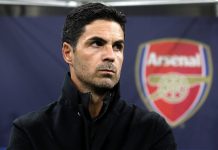On Wednesday night Barcelona beat rivals Real Madrid again, this time with a last minute decider from Lionel Messi; a superb volley which Iker Casillas was unable to keep out.
Yet the game was marred, like the Champions League semi final last season, by an ugly melee after Marcelo’s disgraceful attack on new signing Cesc Fabregas. With Fabregas on the ball by the touchline, Marcelo took the Spaniard out with clearly no ambition to take the ball, wrapping his legs around the former Arsenal man to ensure he fell to the floor.
In the ensuing drama, Marcelo was sent off, as were Mesut Ozil and David Villa, but it was Jose Mourinho, who else, who took the headlines for gouging the eye of Barcelona assistant manager Tito Vilanova.
It was a cowardly attack from behind, after which Mourinho was pushed but retreated with a characteristic smirk on his face.
The drama was revealing, showing up Mourinho’s inferiority complex. Usually the Portuguese doesn’t have anyone to feel inferior to, but in Spain he is very much second best, and it’s not even a close contest. His Real Madrid side improved in the two games of the Super Cup, but they were still clearly second best, with Barcelona’s attack more intelligent and creative than his own.
Mourinho’s career of course, took a stop by Barcelona, when he was the translator for Sir Bobby Robson. After leaving the Nou Camp, he has been on a tour of Europe, experiencing success almost everywhere he has gone; Porto, Chelsea, Inter Milan. Yet Barcelona stand in the way of his continued dominance of the leagues in which he manages .
His team are inferior to Barcelona’s simply because they do not have the cohesion that Pep Guardiola’s side does. Barcelona’s team have trained together since a young age, and though sprinkled with big name signings, they are built on the Xavi-Andres Iniesta partnership which came through their youth ranks. As have new signing Fabregas, Gerard Pique, Victor Valdes, Leo Messi etc. It is a team constructed not by Guardiola only, though his tactical acumen are key, but by coaches, scouts and of course, players themselves. It is a team built by a team.
Madrid is the opposite. With an egotistical coach in Mourinho, and their best players egotists as well, i.e. Cristiano Ronaldo, this is a collection of individuals which an individual, Mourinho, is trying to mould into a team. But Mourinho is finding that not even he can on his own construct a team to match that which Barcelona have put together. His individual talents may be their equals, but as a team they still trail by a considerable distance.
There are two types of coach in this world. One is the Mourinho, a pragmatist. Pragmatists look to play percentages, restrict individual freedom and creativity and rely on direct, organised football to score. For a Mourinho, it must be the manager’s tactics which produce victory and success. If they win, it should be the product of practise on the training field and tactical preparation.
Then there are the likes of Pep Guardiola, following the tradition of the great Johan Cruyff who coached him 20 years ago. Guardiola conversely gives his players the freedom to work out the solutions themselves. For him, success is not the product of tactical preparation, but of Messi or Iniesta seeing space and exploiting it on the pitch. The freedom is there for the players to work out how to win games and score goals using imagination, intelligence and skill. It is the opposite style to that provided by Mourinho.
For Mourinho, Barcelona is the obsession. For his style to be the best, he must beat them. But what he has found is that the style of play which is most effective is that of his rivals; where players work out solutions, not managers. Egotists like Mourinho find it hard to credit the team, but the team is what is most crucial in football.
The Portuguese’s petulance is the result of this realisation. He is not the special one. In football, there are no special individuals. Only teams. And Barcelona are the best of those.







